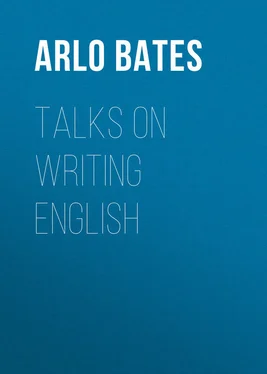Arlo Bates - Talks on Writing English
Здесь есть возможность читать онлайн «Arlo Bates - Talks on Writing English» — ознакомительный отрывок электронной книги совершенно бесплатно, а после прочтения отрывка купить полную версию. В некоторых случаях можно слушать аудио, скачать через торрент в формате fb2 и присутствует краткое содержание. Жанр: foreign_antique, foreign_prose, на английском языке. Описание произведения, (предисловие) а так же отзывы посетителей доступны на портале библиотеки ЛибКат.
- Название:Talks on Writing English
- Автор:
- Жанр:
- Год:неизвестен
- ISBN:нет данных
- Рейтинг книги:5 / 5. Голосов: 1
-
Избранное:Добавить в избранное
- Отзывы:
-
Ваша оценка:
- 100
- 1
- 2
- 3
- 4
- 5
Talks on Writing English: краткое содержание, описание и аннотация
Предлагаем к чтению аннотацию, описание, краткое содержание или предисловие (зависит от того, что написал сам автор книги «Talks on Writing English»). Если вы не нашли необходимую информацию о книге — напишите в комментариях, мы постараемся отыскать её.
Talks on Writing English — читать онлайн ознакомительный отрывок
Ниже представлен текст книги, разбитый по страницам. Система сохранения места последней прочитанной страницы, позволяет с удобством читать онлайн бесплатно книгу «Talks on Writing English», без необходимости каждый раз заново искать на чём Вы остановились. Поставьте закладку, и сможете в любой момент перейти на страницу, на которой закончили чтение.
Интервал:
Закладка:
III
PRINCIPLES OF STRUCTURE
Since it is the object of this book first of all to be practical, it is well, before passing to matters more intricate, to consider for a little the elementary principles of composition. 1 1 In this chapter and the next three I am so greatly indebted to Professor Barrett Wendell’s “English Composition” that this part of my book might almost be called a summary of his, although I have of course omitted much and have introduced some things upon which he has barely touched.
Written language, to repeat what everybody knows, consists of words arranged in sentences, which in turn are grouped into paragraphs, these again being placed together to form whole compositions. In all composition, it may be remarked, it is necessary to remember that the punctuation is as integral and as important a part of what is written as are the words. It is often more easy to forgive the careless printer for altering a word than for changing punctuation, since the reader more easily corrects an error of diction than of pointing. The student has not mastered even the preliminary stages of composition who is not as sure of the punctuation of a page as he is of its grammatical construction.
There is a general vagueness on the subject of the mechanical forms employed in written or printed language which affects the nerves as if it were connected with the moral laxity of the age. There is probably no real connection between the frequency of bank defalcations and a failure to recognize the relative values of the comma and the semicolon, but to a literary man this ignorance is so culpable as almost to seem likely to lead to crime. When an inexperienced writer gets the words down he is apt to suppose that all is well, and frequently he does not even know when to put in a period. It is necessary not only to close a sentence when it is done, but also to bear in mind that if it is not finished putting a period in the middle does not really make two sentences of it. When a tyro finds that his pen is getting out of breath, he has a tendency to set down a period, and then to go on with a conjunction, supposing, in the innocency of his heart, that he is beginning afresh. He is really only setting up the divorced better half – for the latter portion of a sentence should be the better half – in a sort of separate maintenance. The period in such a case has not even the power of a divorce, since it cannot make the separation legal. A sentence is like an ingot: if it be chopped in two, each piece is half of the original whole. It must be melted and recast to make individual ingots of smaller size.
It is also to be noted that students too often fail to recognize the fact that there are reasons as definite and as binding for the divisions of sentences into paragraphs as for the division of words into sentences. A teacher recently told me of the definition of a country schoolboy which, if not over-elegant, represents pretty fairly, it seems to me, the attitude of the common mind toward the paragraph. “A paragraph,” this lad said blunderingly, when called upon to define, “why, a paragraph – a paragraph – it’s – it’s a gob of sentences!” I fancy that most teachers have encountered plenty of pupils who think of a paragraph as merely a “gob” of sentences, – a lump accidentally broken off from the rest of the composition, but possessed of no structural qualities of its own.
The analysis of sentences is common in schools, but, so far as I know, there is little analysis of paragraphs. To my thinking there is more to be gained from the latter than from the former. The analysis of the paragraph calls for a wider view, for a better comprehension of subject, and for a more developed idea of form. I do not wish to be understood as endeavoring to invent a new torture for pupils or one more device for further overburdening teachers already overloaded. I merely call attention to the value as a means of mental and literary training of the study of paragraph structure in the works of the masters of style, and to the fact that such study is an indispensable part of a literary training.
Of course the ultimate appeal in all that concerns the mechanics of composition is to what is commonly called Good Use. All written symbols by which intelligence is conveyed from man to man are arbitrary. It is merely because it is agreed that the character “I” shall represent a sound and that this sound shall stand for an idea, that we are able to bring up the idea in the mind of others simply by writing the sign. That there is nothing innate in the symbol is evident from the fact that other signs have been used to represent this sound, and that other syllables have stood for the pronoun in the first person singular. The examples which might be given to illustrate this point are limited only by the number of words in existence. Consciously or by tacit consent – oftener, of course, by the latter – it has been agreed to attach sounds to ideas and to represent those sounds by definite symbols. It follows that he who wishes to communicate an idea in writing has no resource outside of the means which have been agreed upon by the consent of his fellow-men. A writer may decide to have a new vocabulary and to write it in novel characters. The difficulty is that it will be understood by nobody. He is forced to use the language of men, and to use it in the fashion in which it is employed by others. He is bound by the habit of men who write, established by custom and defined by common acceptance. In other words, he is constrained to follow Good Use.
Good Use is the general agreement in regard to conventions by means of which ideas are conveyed. It is the basis of all composition, and without an intimate knowledge of it no one can write successfully. What the best general agreement is, is to be determined by the practice of the most eminent and widely recognized authors. The fact of their general indorsement and recognition is a sufficient proof that their use is intelligible to their public, and that it is therefore safe to follow them. Their custom decides not because of their authority, but because their reputation proves that their use is the one which is tacitly accepted by intelligent readers, and which is therefore the only one that will insure comprehension.
There are certain things which in writing it is necessary to keep constantly in mind until they are observed unconsciously and instinctively. Always a writer must hold to three Principles of Structure and three Principles of Quality. The division is of course arbitrary, but it is logical and convenient. The three Principles of Structure, – the mechanical principles, so to say, those which direct most obviously the mechanics of language, – are Unity, Mass, and Coherence. The three Principles of Quality – those which govern the inner and more intellectual character of a composition – are Clearness, Force, and Elegance.
The first principle of structure, Unity, has to do with the substance of a sentence or a composition. It is the law which requires that every composition shall be informed with a general intention, shall centre around one fundamental idea; that every paragraph and every sentence shall be dominated by one essential thought or purpose. It is the principle which produces the difference between a well-ordered whole and an unorganized collection of scraps; between a rich embroidery and a sampler, a mosaic and a crazy-quilt. Without Unity as a whole a composition becomes as disjointed as a dictionary, without attaining to the instructiveness of that necessary book; and in degree only less from the proportionate importance of a part to the whole, the lack of Unity in a sentence destroys the value and effectiveness of the entire work.
The second principle, that of Mass, concerns the external arrangement of what is written. It is the rule which enjoins the putting of the chief parts of the composition, of the paragraph and of the sentence, in the places which most readily catch the eye or the ear. This is sometimes spoken of as Emphasis, but the term is hardly comprehensive enough. All questions of proportion come of course under the head of Mass, and so does whatever in the outward form of a composition appeals to the eye.
Читать дальшеИнтервал:
Закладка:
Похожие книги на «Talks on Writing English»
Представляем Вашему вниманию похожие книги на «Talks on Writing English» списком для выбора. Мы отобрали схожую по названию и смыслу литературу в надежде предоставить читателям больше вариантов отыскать новые, интересные, ещё непрочитанные произведения.
Обсуждение, отзывы о книге «Talks on Writing English» и просто собственные мнения читателей. Оставьте ваши комментарии, напишите, что Вы думаете о произведении, его смысле или главных героях. Укажите что конкретно понравилось, а что нет, и почему Вы так считаете.












